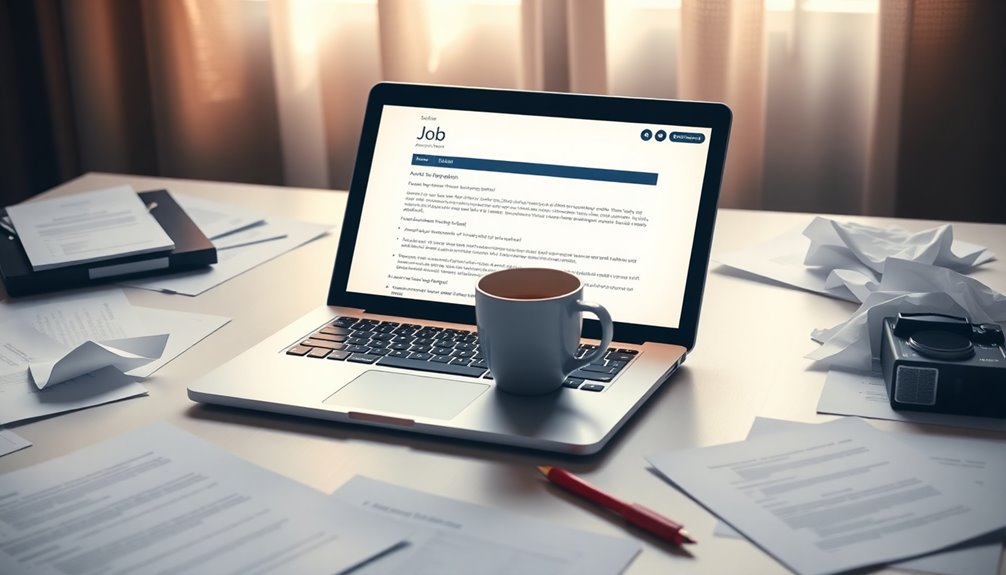Tiny slip-ups can easily ruin your hiring chances. Not following up after an interview can make you seem disinterested. Sending a generic thank-you note? That's a missed opportunity for connection. You've got to show professionalism in both your appearance and communication. Mistakes in your application, like typos or incorrect info, can lead to rejection. Remember to research the company thoroughly; it displays your enthusiasm. Even minor oversights can overshadow your qualifications. Stay aware of these details, and you won't just avoid pitfalls but pave your way to success. Discover more essential tips to enhance your application strategy!
Key Takeaways
- Neglecting to personalize your application materials can make you appear uninterested and reduce your chances of standing out to hiring managers.
- Typos and grammatical errors in resumes or cover letters signal a lack of attention to detail, potentially costing you the job.
- Failing to follow up after interviews may suggest disinterest and could lead to missed opportunities for further engagement.
- Arriving late to interviews demonstrates disrespect for the interviewer's time and may create a negative first impression.
- Ignoring feedback from interviews can hinder your chances in future opportunities, as it shows a lack of willingness to improve.
Importance of Communication

Effective communication is a cornerstone of successful job hunting. As a job seeker, staying in touch with recruiters can make a significant difference in your chances of landing a position. Following up after an interview is essential; neglecting to do so might signal disinterest and cost you valuable opportunities. Recruiters appreciate timely communication, especially when you express gratitude for the interview. This simple act not only showcases your professionalism but also reinforces your enthusiasm for the role.
Clear communication about your job status is equally important. If you accept another offer, let the recruiters know. This fosters mutual respect and prevents assumptions about your disinterest. Conversely, ghosting recruiters by skipping interviews without notice can frustrate them and tarnish your reputation in the job market.
Building relationships through effective communication is key in recruitment. It reflects your genuine interest and helps recruiters in their decision-making process. Remember, every interaction counts, and strong communication can set you apart from other candidates. So, make it a priority in your job search to communicate clearly and consistently—it's a small effort that can lead to significant rewards. Additionally, establishing healthy boundaries during the hiring process can help clarify expectations and maintain professionalism.
Professionalism in Interviews

When you're preparing for an interview, remember that professionalism is key. This means doing your homework on the company, maintaining a respectful demeanor, and dressing appropriately. Each of these elements plays an essential role in making a strong, positive impression.
Company Research Importance
In today's competitive job market, conducting thorough company research is essential for candidates aiming to make a strong impression during interviews. Forgetting the company name or confusing it with another can signal a lack of genuine interest and preparation. To stand out, you need to know the company's products, services, and values, as this illustrates your alignment with their mission and culture.
Familiarizing yourself with recent company news or developments can also showcase your enthusiasm and proactive engagement. If you can discuss current events related to the company, it shows you're invested in their success. Additionally, preparing specific questions about the company exemplifies your commitment and helps you engage more effectively during the interview.
Don't overlook the formality of the company's interview environment, as this can influence your attire choices. Dressing appropriately impacts first impressions and reflects your professionalism. Remember, thorough company research not only elevates your job application but also positions you as a well-prepared candidate ready to contribute positively to the organization. Moreover, understanding the company's culture of shared responsibility can significantly enhance your ability to fit into their team dynamics. Make this a priority to avoid common slip-ups that could derail your chances.
Professional Demeanor Matters
Company research sets the stage for a successful interview, but how you present yourself during that meeting can make all the difference. Maintaining a professional demeanor is essential. Casual language and behavior can lead the interviewer to question your suitability for the role. Arriving on time is an easy yet effective way to demonstrate professionalism; it shows you respect the interviewer's time and sets a positive tone for the meeting.
Dressing appropriately according to the company's culture also enhances your professional demeanor. Business casual is often a safe choice, striking the right balance between formal and relaxed. Furthermore, being well-prepared by understanding the company's values and recent developments reflects genuine interest and commitment, further enhancing your professionalism. Additionally, having a clear plan for advance directives can demonstrate your ability to think ahead and manage responsibilities effectively.
Avoid slandering previous employers during your interview, as this can create a negative impression. It suggests a lack of professionalism and raises concerns about your character. In your job search, remember that every interaction counts. By focusing on these aspects of your professional demeanor, you'll greatly increase your chances of making a lasting impression and securing the job you want.
Attire and Presentation Standards
Choosing the right attire and presentation for an interview plays a significant role in making a positive impression. Inappropriate attire can create a negative first impression, so it's essential to dress in business casual or according to the company's culture to reflect professionalism. Researching dress expectations can help you avoid extremes in elegance or casualness, ensuring you present yourself appropriately.
Here are some tips to keep in mind:
- Understand the company culture and dress code.
- Opt for well-fitted, clean, and wrinkle-free clothing.
- Pay attention to grooming, including hair and personal hygiene.
- Choose neutral colors and classic styles to convey professionalism.
A polished appearance not only influences the interviewer's perception but also sets the tone for the discussion. When you feel well-dressed, you're more likely to convey confidence and self-assurance. Maintaining consistency in your personal branding, including your attire during interviews, reinforces your commitment to professionalism and attention to detail. Remember, your attire isn't just about looking good; it's about showcasing your seriousness about the opportunity.
Attention to Application Details

When you're applying for a job, every detail matters. You need to personalize your cover letter, proofread for any errors, and follow the application instructions closely. Ignoring these details can hurt your chances of landing an interview, so take the time to make your application stand out.
Importance of Personalization
Personalization can be the key that opens the door to your next job opportunity. When you apply for jobs, taking the time to tailor your application materials can greatly boost your chances of landing an interview. Generic templates simply don't capture the attention of hiring managers. Here's why personalization matters:
- It shows genuine interest in the role and the company.
- Customizing your CV according to the job description keeps you in the running.
- A well-researched understanding of the company's culture and values sets you apart.
- Consistency in formatting enhances readability and professionalism.
When you take the time to personalize your cover letter and resume, you demonstrate commitment and dedication, qualities recruiters highly value. Ignoring application instructions can lead to immediate disqualification, so make sure to follow them closely. You want to showcase your enthusiasm and fit for the organization, not just your qualifications. By investing effort into personalizing your applications, you'll not only stand out from the competition but also increase your chances of making a lasting impression. Don't underestimate the power of personalization; it can be the difference between getting an interview or being overlooked. Additionally, being aware of common small mistakes during the application process can help you avoid pitfalls that might hinder your chances.
Proofreading for Errors
A thorough proofreading process is essential for guaranteeing your application materials are error-free and professional. Typos and grammatical errors can greatly detract from your professionalism and lead recruiters to question your attention to detail. You don't want to make mistakes that could cost you the job title you're aiming for.
Here's a quick checklist to help you proofread effectively:
| Checkpoint | Action | Importance |
|---|---|---|
| Grammar and Spelling | Use tools like Grammarly | Avoids common errors |
| Formatting Consistency | Verify CV and cover letter match | Enhances readability |
| Document Attachments | Confirm all required files are attached | Prevents disqualification |
Personalizing your cover letter shows effort, but remember to double-check everything. Forgetting to attach required documents is a common error that can lead to immediate disqualification. Make sure you follow any specific application instructions you receive; ignoring them can signal disinterest and may cause you to be overlooked. Proofreading is your first line of defense against these pitfalls. Additionally, utilizing tools like automation tools can help streamline your application process and ensure you don't miss crucial details. Take the time to do it right!
Following Application Instructions
Attention to detail is essential in the job application process, and following instructions can greatly impact your chances of getting noticed. Ignoring application instructions—like failing to attach required documents or not adhering to formatting guidelines—can lead to immediate disqualification. Even a small mistake can cost you an opportunity.
To avoid common pitfalls, keep these points in mind:
- Customize your application: Impersonal templates signal disinterest.
- Follow formatting guidelines: Consistency enhances readability and reflects professionalism.
- Proofread your submission: Typos and errors can detract from your overall impression.
- Use specified subject lines: This helps recruiters organize and prioritize applications.
Role of Technology in Recruitment

Technology plays an essential role in modern recruitment, transforming how employers and candidates connect. With online platforms and Applicant Tracking Systems (ATS), the application process has become more streamlined. Understanding how ATS works can greatly enhance your CV formatting, increasing your chances of passing initial screenings.
Virtual interviews are now common, allowing you to connect with employers remotely. This not only widens the pool of applicants but also adds flexibility to your job search. Online networking tools enable you to engage with industry professionals, boosting your visibility and opening doors for potential job opportunities through referrals.
Here's a quick overview of how technology impacts recruitment:
| Aspect | Description | Benefits |
|---|---|---|
| ATS | Filters candidates based on specific criteria | Increases chances of getting noticed |
| Virtual Interviews | Connects candidates and employers remotely | Offers flexibility and wider reach |
| Online Networking | Engages job seekers with professionals | Enhances visibility and referrals |
Data shows that timely follow-ups through digital communication can greatly improve your chances of securing a position, showcasing your professionalism and enthusiasm. Embrace these tech tools to elevate your job search! Moreover, leveraging machine learning tools can significantly enhance recruitment processes by providing better candidate matching through advanced analytics.
Handling Mistakes Gracefully

Mistakes happen to everyone, especially during the high-pressure hiring process. It's how you handle these slip-ups that can make or break your chances. Maintaining your composure is vital; panicking only exacerbates the situation. Here's how to manage mistakes gracefully:
- Apologize promptly: If something goes wrong, acknowledge it right away. A sincere apology shows professionalism.
- Take corrective action: Don't just apologize—offer a solution or a way to rectify the mistake.
- Learn from mistakes: Reflect on what went wrong and how you can avoid similar issues in the future. This proactive approach demonstrates growth.
- Prepare for potential slip-ups: Anticipating possible errors can help you handle them effectively, reducing anxiety and showcasing your commitment to improvement.
Recognizing that mistakes are common in the hiring process can ease your nerves and promote resilience. By responding thoughtfully and learning from your experiences, you'll not only improve your future applications but also leave a positive impression on potential employers. Remember, it's not about never making mistakes; it's about how you respond that truly counts. Additionally, understanding that state-specific benefits can enhance your financial security may help you feel more prepared and confident during interviews.
Networking and Building Connections

In today's job market, networking and building connections can be your ticket to success. Referrals from industry contacts often enhance your chances of landing interviews, so make sure you're actively engaging with professionals in your field. This engagement offers valuable insights into company culture, allowing you to tailor your application to align with specific organizational values.
Attending industry events and conferences is another fantastic way to expand your network. These gatherings provide opportunities to meet potential employers and learn about unadvertised job openings that aren't posted publicly. When you consistently network, you increase your visibility and access to job opportunities that might otherwise slip through the cracks.
Don't underestimate the power of online platforms like LinkedIn. By utilizing these tools effectively, you can enhance your professional visibility and tap into a broader pool of job prospects. Make sure you're connecting with others, sharing relevant content, and engaging in discussions. Each connection could lead to a new opportunity or valuable insight, so keep nurturing those relationships. Additionally, consider leveraging digital creativity in your networking strategy to stand out in a competitive job market. Remember, the more you network, the better your chances of finding the right job for you.
Common Application Mistakes

Many candidates overlook essential details when submitting job applications, which can greatly impact their chances of landing an interview. To increase your odds of being seen as a good fit, avoid these common application mistakes:
- Applying to multiple positions without tracking: This can lead to confusion and errors that signal disinterest to recruiters.
- Failing to customize your cover letter: A generic letter diminishes your perceived effort and enthusiasm, making you less competitive.
- Typos and formatting inconsistencies: Small mistakes can detract from your professionalism and may even get you disqualified.
- Ignoring application instructions: Forgetting to attach required documents can lead to immediate disqualification.
Additionally, remember that following up after submitting your application or interview is vital. It shows you're genuinely interested in the role and that you must work to secure it. By addressing these slip-ups, you'll not only present yourself better but also enhance your chances of making a strong impression on potential employers. Being attentive to these details can set you apart and show recruiters that you're committed to the opportunity.
Frequently Asked Questions
How Can I Prepare for Unexpected Interview Questions?
To prepare for unexpected interview questions, you should practice thinking on your feet. Start by reviewing common interview questions and crafting thoughtful responses. Then, challenge yourself with random prompts or scenarios. Role-playing with a friend can also help you get comfortable. Stay calm and remember, it's okay to take a moment to think before answering. This way, you'll build confidence and improve your ability to handle whatever comes your way.
What Should I Do if I Miss an Application Deadline?
Did you know that nearly 30% of job applicants miss application deadlines? If you miss one, don't panic. First, reach out to the employer or hiring manager to express your interest and inquire if they'll still accept your application. Next, keep applying to other opportunities. Finally, reflect on what led to missing the deadline to improve your time management for future applications. Remember, persistence often pays off in the job search!
How Important Is Body Language During Interviews?
Body language during interviews is essential. It helps you convey confidence and engagement, making a strong impression on interviewers. When you maintain eye contact, sit up straight, and use open gestures, you're showing that you're interested and approachable. Conversely, crossed arms or fidgeting can signal discomfort or disinterest. So, pay attention to your non-verbal cues; they can greatly influence the interviewer's perception of you and your fit for the role.
Should I Follow up After Submitting My Application?
Absolutely, you should follow up after submitting your application. It shows your enthusiasm and helps keep your name fresh in the employer's mind. Wait about a week or two before reaching out, and keep your message concise and professional. Just express your interest in the position and inquire about the status of your application. This simple step can set you apart from other candidates and demonstrate your proactive attitude.
How Can I Improve My Resume for Better Chances?
Imagine your resume as a storefront window; if it's cluttered, no one's stopping to take a look. To improve your resume, tailor it for each job by highlighting relevant skills and experiences. Use clear, concise language and bullet points to make it easy to read. Don't forget to quantify your achievements—numbers catch attention! Finally, proofread carefully; a polished resume shows you care about your application, boosting your chances considerably.
Conclusion
In the competitive job market, even the smallest slip-ups can derail your chances, much like a tiny crack in a dam can lead to a massive flood. By prioritizing clear communication, showcasing professionalism, and paying attention to every detail, you can fortify your application against potential pitfalls. Remember, your resume is your first impression—make it count! Stay connected and learn from your mistakes; every step you take brings you closer to your dream job.









